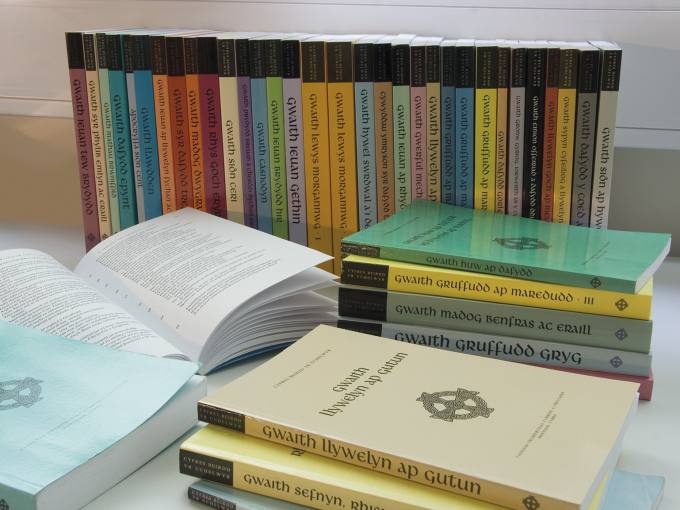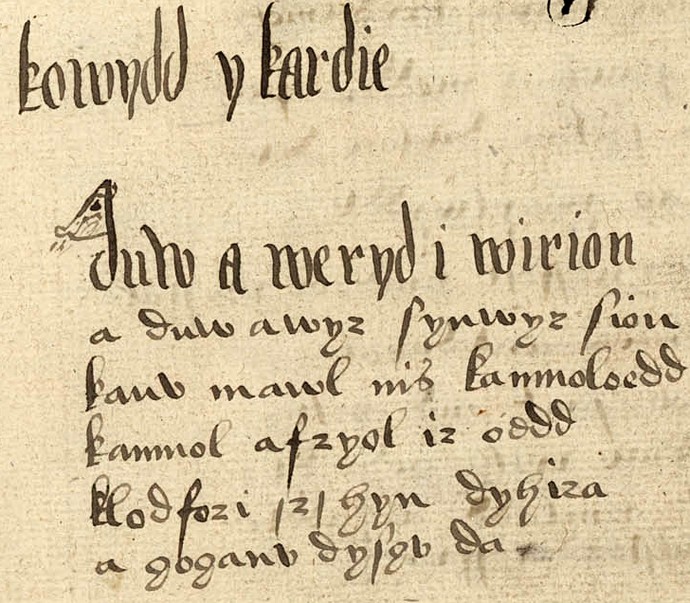The Poets of the Nobility

The Poets of the Nobility
The Poets of the Nobility
The Beirdd yr Uchelwyr Series, which contains 44 volumes, was the product of a research project that was formally undertaken at the Centre for Advanced Welsh and Celtic Studies between 1993 and 2008, continuing to publish volumes until 2015. More volumes will hopefully be added to the Series in the future, as well as updated editions, based on new information and research. Successive teams of researchers carried out the research, supported by the University of Wales and by grants from the AHRB, AHRC, the Skaggs Foundation and others (details can be found in the individual volumes), and before publication each volume was read thoroughly by a very dedicated Editorial Board. The project was adopted as one of the research projects of the British Academy.
- 44 volumes
- over 1,100 poems sung between 1282 and 1550
- over 61,000 lines of poetry
- the work of around 120 known poets and around 75 poems by unnamed poets

The Poets of the Nobility: Fuller Description
The Centre’s first project was an ambitious scheme to edit all the poetry of the Poets of the Princes in seven volumes under the editorship of Professor R. Geraint Gruffydd, the first Director of the Centre as a University of Wales institution. While working on this project, it became apparent that there existed a very considerable body of unedited poetry belonging to the period following that of the Poets of the Princes, namely the Poets of the Nobility. As the first project drew to a close, planning commenced for the Centre’s third project to edit the unedited work of the period 1282–1525. A list of all the poets and poems of the period was compiled in co-operation with the staff of the National Library of Wales, and with the aid of the computerized index to the manuscript poetry (MALDWYN). The volume of poetry to be edited was far more substantial than in the case of Project 1.
It was decided to concentrate initially on the fourteenth-century poetry, which was certainly one of the most important and exciting centuries in Welsh literature. Several poets continued to compose praise poetry and eulogy in the old style using the traditional metres, while at the same time Dafydd ap Gwilym and his followers began to develop the very different cywydd metre in order to elevate new themes, such as love. This was a turning-point in the strict-metre poetry, the period being characterized by a mixture of the old and traditional with the new and exciting. By the fifteenth century the number of poets and poems had increased substantially. This was the golden age of the cywydd metre.
The project was launched in 1993 and Professor Ann Parry Owen was appointed general editor and project leader. The project benefited from the vast knowledge of the late Professor J. E. Caerwyn Williams (who was also the Consultative Editor for Project 1) and the late Professor R. Geraint Gruffydd (who was the General Editor for Project 1) and the support of an Editorial Board of four eminent Welsh scholars, who regularly commented on each volume.
The poems are published in modern orthography, and punctuated. The editorial method is described in the individual volumes. In the case of poems from the fourteenth century, and some other poems that are considered particularly difficult, a paraphrase in contemporary Welsh is given. There are detailed notes on each poem which explain any difficulties in the text and also the references to historical and legendary people, places and characters. Before each poet’s work, there is an introduction discussing his life, his dates, his patrons and the nature of his poetry. At the end of each volume there are indexes and full lists of the manuscripts used for the edition.
The Beirdd yr Uchelwyr Series was published between 1994 and 2015 under the copyright of the University of Wales. In 2022 Ann Parry Owen received a grant from the Coleg Cymraeg Cenedlaethol to update the electronic files and convert them to PDF, to be offered freely in their Resource Hub under the licence CC BY-NC-SA 4.0. The PDF files are reprints with minor changes or corrections. The original Word files were updated, keeping as close as possible to the pagination of the print volumes.
The poet visits his nephews at Christmas
This is my task with my lords,
And I am also their agéd relative:
To read civil law to my kinsmen
(There is need of a fluent voice);
To dress myself in their fine gifts,
Green clothing from the splendid hand of each;
To satirize loudly that furious crew,
You can hear their commotion, the dunghill minstrels;
Gift after gift I’ve received,
Earnestly comparing my love, Lleucu Llwyd,
To a fair, blooming rose in a beautiful garden,
To the noble Virgin Mary, or to the brilliant sun.
It’s delightful for this scrawny old man
(There is a good time to be had on Sunday)
To hear the sounds which Christmas brings:
Cooks slicing into meat,
Barking of shaggy hunting dogs, I know for sure,
Straining at their chains,
The harmony of the lively crwth and the bagpipes,
The voices of peacocks in unison,
And the Sanctus bells, and laughter,
And the calling of men to wine.
Llywelyn Goch ap Meurig Hen ( fl . c .1350– c .1390)
